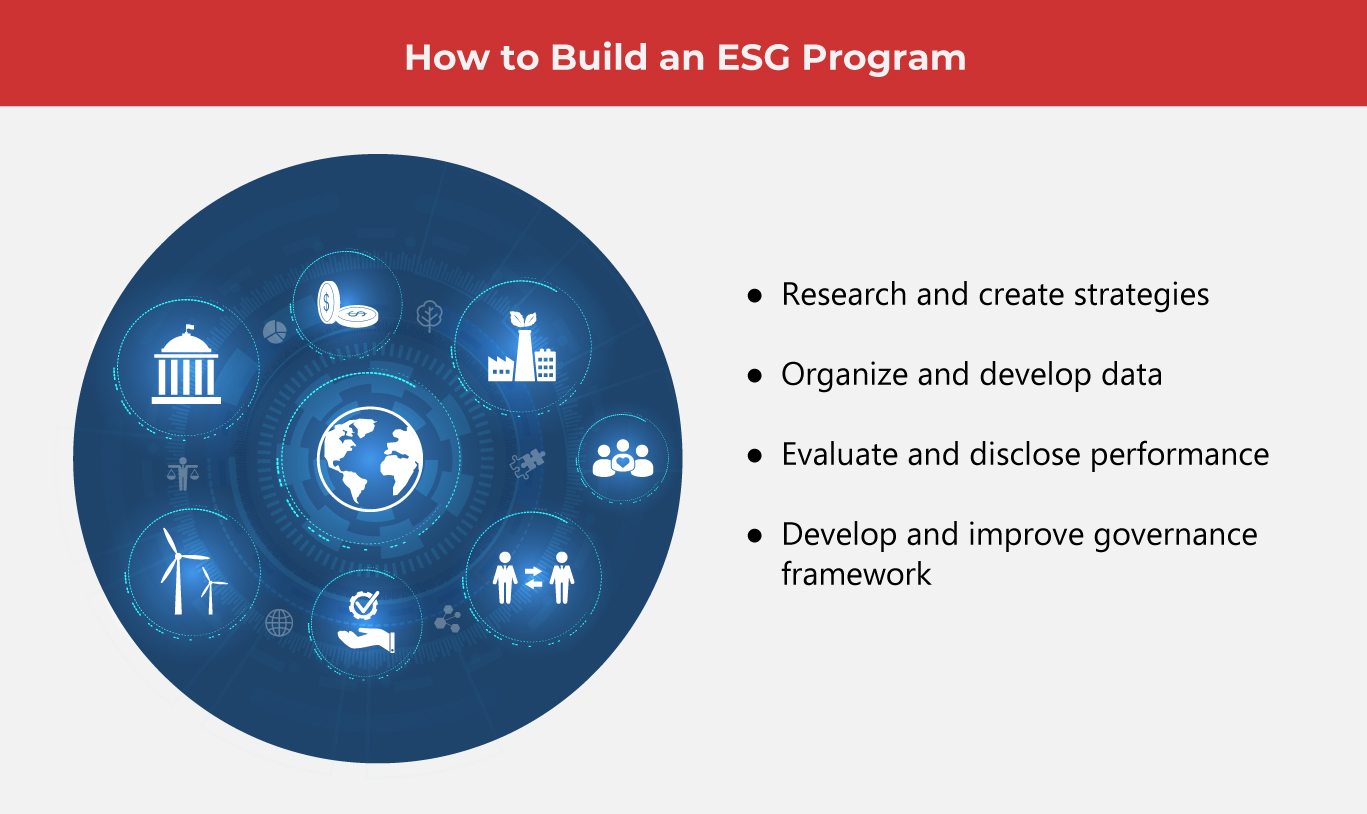Why ESG Is Good for Your Biz

ESG (environmental, social, and governance) practices, once seen as a trend, have become essential to business strategies and investment decisions across industrial markets. In global manufacturing, ESG has long been critical due to the industry's environmental impact, including pollution and resource depletion, alongside concerns over worker safety, supply chain management, and efficiency.
With growing awareness of sustainability and environmental indicators, ESG now holds companies and nations accountable for their impacts on the environment and society. Firms face pressure from governments, consumers, and investors to adopt ESG practices. Those integrating ESG successfully enhance their competitive advantage, adaptability, and long-term value while avoiding legal and reputational risks.
What is ESG?
Environmental, social, and governance (ESG) is a system for evaluating a company's sustainability practices and ethical performance. It also helps identify business challenges and potential related to these areas.
Here are key ESG criteria frequently utilized by businesses and investors:
-
Environmental
Environmental factors focus on evaluating an organization's impact on the environment, including the difficulties or opportunities due to ecological concerns, such as climate change and resource conservation efforts.
-
Social
Social factors focus on how a company interacts with various groups, including employees, suppliers, clients, and the broader community. These elements reflect the company’s commitment to ethical treatment and social responsibility.
-
Governance
Governance factors assess how a company governs itself, emphasizing internal policies and controls to ensure adherence to regulations, industry standards, and corporate guidelines. This includes transparency in decision-making, ethical leadership, accountability, and maintaining a strong framework to prevent corruption or misconduct.
7 ESG trends in manufacturing industries
Recent trends in ESG within the manufacturing industry highlight a growing commitment to sustainability, ethical practices, and corporate responsibility.
-
Sustainable manufacturing through smart technologies
As the manufacturing sector embraces digital transformation, companies increasingly adopt technologies like artificial intelligence (AI), digital twins, virtual reality (VR), augmented reality (AR), and cloud computing to improve operational efficiency and competitiveness. Organizations recognize that integrating these technologies can help them formulate manufacturing solutions and meet ESG goals without requiring significant additional resources. For instance, improved data utilization identifies ESG weaknesses and minimizes environmental impacts, while smart manufacturing technologies facilitate waste reduction and optimize energy consumption through smarter processes and equipment.
-
Supply chain openness and fair sourcing practices
Stakeholders now demand responsible practices regarding raw material sourcing, fair employment, and compliance with environmental policies. Supply chains significantly impact the environment, so enhancing transparency allows companies to pinpoint negative effects and adopt green approaches. Prioritizing clear supply chains and responsible sourcing is now becoming standard in the industry, as companies understand that these practices are essential for improving ESG performance.
-
Adoption of Circular Economy Practices
ESG has significantly influenced how global manufacturing companies view the lifecycle of their products and materials, prompting a shift towards a circular economy model. This approach emphasizes restoring, renewing, and reprocessing to extend product lifespans, thereby reducing waste and reliance on limited resources. By embracing circular economy principles, companies can meet ESG targets and promote sustainable growth. This strategy fosters brand loyalty, drives innovation, and opens new revenue opportunities, all while supporting the goal of achieving net zero emissions through effective industrial solutions.
-
Commitment to innovation
The evolution of ESG in manufacturing has sparked significant innovation within the industry, traditionally known for its resistance to change. ESG initiatives drive transformation as manufacturers adopt advanced technologies to optimize resources and reduce carbon footprints. For example, by equipping workers with wearable devices, companies improve training efficiency and lower travel-related emissions. Sustainable product design and development is also prioritized, focusing on fewer components and recyclable materials. To effectively manage ESG projects, manufacturers aim for visibility and data, ensuring compliance with sustainability goals while navigating turbulent markets.
-
Resolving workforce gaps
Amid ongoing labor shortages in manufacturing, ESG principles are crucial for attracting, retaining, and engaging employees. With ESG, companies can promote a healthy work-life balance, offering growth opportunities and demonstrating social responsibility. These initiatives not only mitigate labor shortages but also motivate employees to perform at their best. Additionally, younger generations, particularly millennials and Gen Z, prioritize sustainability and ESG commitments when choosing employers. This makes it essential for companies to invest in these areas to secure top talent as their workforce grows.
-
Fulfilling customers’ ESG requirements
As ESG gains prominence in the consumer sector, manufacturing companies must connect their products to the ESG targets of their customers. For instance, a clothing manufacturer might focus on using sustainable fabrics and ethical labor practices to appeal to environmentally conscious consumers. Similarly, a food processing company could emphasize organic ingredients and eco-friendly packaging to support sustainability initiatives. Purchasers are increasingly seeking detailed information about suppliers’ environmental impacts, as consumers—who are also investors—prefer finished goods produced with minimal environmental harm.
-
ESG data growth
Businesses that neglect to adhere to ESG standards may soon face substantial regulatory fines. Over 70 countries have implemented laws to curb plastic waste, with 170 nations pledging to significantly decrease plastic usage by 2030. As the regulatory landscape evolves and more ESG programs are adopted, manufacturers and businesses must meet sustainability targets to avoid penalties.
Benefits of leveraging ESG
Integrating ESG principles into business strategies provides organizations with a strategic advantage, paving the way for transformative opportunities in today's competitive landscape.
-
Attracting investments
Investors are seeking detailed data on sustainable investing due to ESG risks, particularly related to climate-related reporting. This heightened scrutiny is prompting banks to prioritize companies that can clearly showcase their commitment to environmental stewardship, social responsibility, and governance. As a result, firms with robust ESG policies are increasingly seen as more attractive investments, reflecting a shift in market dynamics where sustainability considerations play a crucial role.
-
Expanding customer base
ESG can help companies attract new customers and drive growth. Consumers and businesses that prioritize ESG in their purchasing decisions often prefer products and services from companies committed to these values. By adopting a robust ESG strategy, businesses can explore new markets and strengthen their presence in existing ones.
-
Making sustainability the standard
ESG investing encourages companies to pursue beneficial investment choices that align with sustainability goals. By focusing on ESG, organizations can enhance their investment returns by directing capital toward more viable and sustainable opportunities, such as using clean energy and eco-friendly equipment. This strategic approach not only fosters long-term growth but also positions companies as leaders in innovation while ensuring good standing with government regulations and expectations.

 As one of the Top 20 EMS companies in the world, IMI has over 40 years of experience in providing electronics manufacturing and technology solutions.
As one of the Top 20 EMS companies in the world, IMI has over 40 years of experience in providing electronics manufacturing and technology solutions.
We are ready to support your business on a global scale.
Our proven technical expertise, worldwide reach, and vast experience in high-growth and emerging markets make us the ideal global manufacturing solutions partner.
Let's work together to build our future today.
Other Blog



